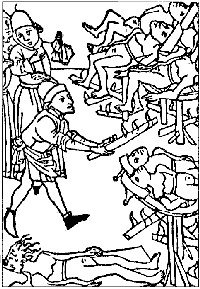|
"There shall be no slavery of the mind." --- Victor Hugo |

|
TOL·ER·ANCE (n.)
1. The capacity for or the practice of recognizing and respecting the beliefs or practices of others. 2.a. Leeway for variation from a standard. b. The permissible deviation from a specified value of a structural dimension, often expressed as a percent. |
As Robert Green Ingersoll pointed out, to "tolerate" someone is to make an "assumption of authority" and it is therefore invalid to say to another "I tolerate you" or "I tolerate your religion / beliefs." One does not have the authority to "tolerate" someone else's religious beliefs: that is the default condition, and requires no act or largesse on anyone's part. Therefore when I write about religious tolerance, I am speaking about the fact that one has no right to perform any wrongful act against a person or group based only upon that person's or group's religion, religious beliefs, or lack of religious beliefs. The default is if they cause no harm, leave them alone.
Note that harmful actions caused in the name of a church, religion, or religious belief are certainly open to criticism: it is not being intolerant or bigoted to castigate criminal, unethical, and immoral behavior. Indeed, it is a human being's duty to oppose criminal acts regardless of who commits them. Crimes committed in the name of religion are still crimes, and must therefore be denounced.
Molko v. Holy Spirit (46 Cal. 3d 1092; 762 P.2d 46; 1988 Cal. LEXIS 236; 252 Cal. Rptr. 122) to wit: "However, while religious belief is absolutely protected, religiously motivated conduct is not." (Sherbert v. Verner (1963) 374 U.S. 398, 402-403 [10 L.Ed.2d 965, 969-970, 83 S.Ct. 1790]; People v. Woody (1964) 61 Cal.2d 716, 718 [40 Cal.Rptr. 69, 394 P.2d 813].) "Such conduct remains subject to regulation for the protection of society." (Cantwell v. Connecticut, supra, 310 U.S. at p. 304 [84 L.Ed. at p. 1218].)

|
| Crusaders torturing Jews. |
If someone's religion "does not break your bones or pick your pocket," you are ethically and morally obligated to LEAVE THEM ALONE and thus tolerate them. It costs you nothing to do so, and it is wrong to do otherwise.
![]()
David M. Rice
| In Defense of Wicca. | Defending the Earth-Centric neo-Pagan Religion. |
| Religious Apologetics | A Excellent Collection of Essays. |
| The Origin of Religious Tolerance | Essay On Voltair's Essay. |
| The American Civil Liberties Union | The Formost Defenders of Religious Freedom. |
| USA Freedom |
The American Idea of Religious Freedom. By Philip Schaff. Born in Coire, Switzerland, 1819. |
| On Tolerance | Robert G. Ingersoll: The Limitations of Toleration |
| Concerning Toleration |
A Letter Concerning Toleration, by John Locke. (ca. 1689) |
| A Memorial and Remonstrance. | To the Honorable the General Assembly of the Commonwealth of Virginia |
| "If there is any principle of the Constitution that more imperatively calls for attachment than any other it is the principle of free thought -- not free thought for those who agree with us but freedom for the thought we hate." -- Justice Oliver Wendell Holmes, United States v. Schwimmer, 1929. |

What is tolerance? It is the consequence of humanity. We are all formed of frailty and error; let us pardon reciprocally each other's folly --- that is the first law of nature.It is clear that the individual who persecutes a man, his brother, because he is not of the same opinion, is a monster. That admits of no difficulty. But the government! but the magistrates! but the princes! how do they treat those who have another worship than theirs?
Madmen, who have never been able to give worship to the God who made you! Miscreants, whom the example of the Noachides, the learned Chinese, the Parsees and all the sages, has never been able to lead! Monsters, who need superstitions as crows' gizzards need carrion! you have been told it already, and there is nothing else to tell you --- if you have two religions in your countries, they will cut each other's throat; if you have thirty religions, they will dwell in peace. Look at the great Turk, he governs Guebres, Banians, Greek Christians, Nestorians, Romans. The first who tried to stir up tumult would be impaled; and everyone is tranquil.
Of all religions, the Christian is without doubt the one which should inspire tolerance most, although up to now the Christians have been the most intolerant of all men. The Christian Church was divided in its cradle, and was divided even in the persecutions which, under the first emperors, it sometimes endured. Often the martyr was regarded as an apostate by his brethren, and the Carpocratian Christian expired beneath the sword of the Roman executioner, excommunicated by the Ebionite Christian, that which Ebionite was anathema to the Sabellian.
This horrible discord, which has lasted for so many centuries is a very striking lesson that we should pardon each other's errors; discord is the great ill of mankind; and tolerance is the only remedy for it.
There is nobody who is not in agreement with this truth, whether he meditates soberly in his study, or peaceably examines the truth with his friends. Why then do the same men who admit in private indulgence, kindness, justice, rise in public with so much fury against these virtues?
"I possess a dignity and a power founded on ignorance and credulity; I walk on the heads of the men who lie prostrate at my feet; if they should rise and look me in the face, I am lost; I must bind them to the ground, therefore, with iron chains."Thus have reasoned the men whom centuries of bigotry have made powerful. They have other powerful men beneath them, and these have still others, who all enrich themselves with the spoils of the poor, grow fat on their blood, and laugh at their stupidity. They all detest tolerance, as partisans, grown rich at the public expense fear to render their accounts and as tyrants dread the word liberty. And then, to crown everything, they hire fanatics to cry at the top of their voices: "Respect my master's absurdities, tremble, pay and keep your mouths shut."It is thus that a great part of the world was long treated; but today, when so many sects make a balance of power, what course to take with them? Every sect, as one knows, is a ground of error; there are no sects of geometers, algebraists, arithmeticians, because all the propositions of geometry, algebra and arithmetic are true. In every other science one may be deceived.
If it were permitted to reason consistently in religious matters, it is clear that we all ought to become Jews, because Jesus Christ our Saviour was born a Jew, lived a Jew, died a Jew, and that he said expressly that He was accomplishing, that He was fulfilling the Jewish religion. But it is clearer still that we ought to be tolerant of one another, because we are all weak, inconsistent, liable to fickleness and error. Shall a reed laid low in the mud by the wind say to a fellow reed fallen in the opposite direction: "Crawl as I crawl, wretch, or I shall petition that you be torn up by the roots and burned"?
